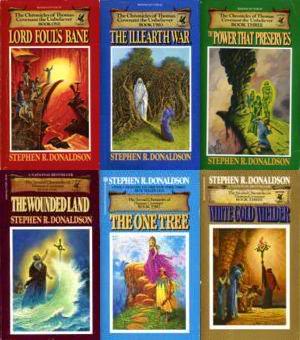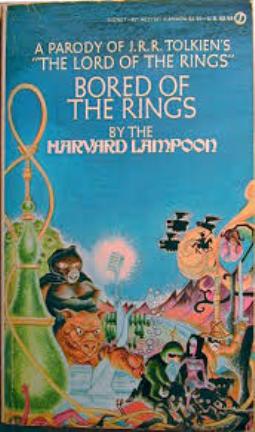Why Humorous Fantasy Isn’t Popular

Dave Langford describes Clench Racing thus:
Up to six can play. The rules are simple: each player takes a different volume of Stephen Donaldson’s blockbuster Chronicles of Thomas Covenant, opens it at random, and leafs feverishly through the text. You win by being first to find the word “clench” (or “clenched”, “clenching”, etc). It’s a fast, furious sport, and a round rarely lasts a full minute.
Clearly, Fandom has a tradition of affectionate mockery of the books it loves. Furthermore, Geeks, the cultural group that includes Fandom, tend to value intelligent wit. It seems odd then that Humorous Fantasy isn’t a massive subgenre.
It’s hard to get facts and figures. An industry insider friend says that Humorous Fantasy’s bestseller/midlist ratio is the same as for other subgenres, it’s just that there’s less of it. Similarly, two authors I know who had humorous fantasy series that petered out both said that the main problem was the size of the market. One of them told me about how at conventions people’s eyes glazed when he talked about his humorous series, but lighted up when he talked about other projects.
Of course, you could argue that Terry Pratchett is so prolific and so very good, that he simply absorbed the subgenre. However, in Heroic Fantasy there’s room for Patrick Rothfuss and Joe Abercromby. George RR Martin may dominate Epic Fantasy, but he has peers. It seems that a typical reader has slots for several favorite authors in a couple of chosen subgenres, but just one slot for Terry Pratchett Humorous Fantasy.
So, I don’t think I’m going out on a limb assuming that Humorous Fantasy isn’t popular compared to other Fantasy subgenres. Why is this?
My three friends each separately put to the market for Humorous Fantasy being the intersection between People Who Like Fantasy and People Who Like Humor, both minorities. One of them pointed out that humor is a personal thing, so hard to craft such as to appeal as widely as say violence with swords.

Without wanting to go all Aristotle on you, there’s are roughly three kinds of humor in Humorous Fantasy, all of which Terry Pratchett demonstrated:
Fantasy Genre as “straight man“. The author plays off the genre either by jumping out of it with quasi-anachronistic references — Pratchett’s shopping trolleys, and grenades as a throwaway line in Harvard Lampoon’s Bored of the Rings: A Parody (do you remember that one?) — putting in awful puns that the characters are not aware of, or else by overlaying the story with an arch or ironic narrative. The problem with this is that Fantasy relies on a pretty fragile suspension of disbelief. Too much of this and the straight man vanishes.
Fantasy Genre as Figure of Fun. We’re talking parody. Looked at from the wrong angle, Fantasy is Mr Bean, inherently preposterous. Much of Color of Magic’s humor came from this and the same goes for all the various sendups such as Bored of the Rings. The problem with this is that it’s only funny if you already read Fantasy and are familiar with its tropes, meaning you like Fantasy. There’s a limit to how much of this you can take.
Fantasy as Arena for Comedy. This is why we read Pratchett: Wyrd Sisters… Guards… Small Gods… Hogfather. They’re comedy in the way Shakespeare’s Midsummer Night’s Dream is comedy. They’re not laughing at the genre or playing games with it. They’re using Fantasy to find the absurdity in the tragic human condition. And they’re being zany.
There are two problems with this:
First, this must be hellaciously difficult to write. It’s hard to show the absurdity in a generic human condition thing without also tweaking the absurdity in the Fantasy setting. Hard, also, to be zany without either making the genre a figure of fun or undermining suspension of disbelief to the extent that the zany just becomes “random stuff”.
Pratchett pulls this off adeptly: Wizards aren’t funny; a community of quirky old bachelors is. The “uncontrolled random generation of a number of anthropomorphic personifications” such as the Eater of Socks is funny, but the characters think so too, making the setting more, rather than less, real.
Second, you can’t do the zany without the human condition stuff to ground it, and looking too long at the absurdity of the the tragic human condition is bruising. Small Gods, for example, was hilarious, but also profound and, if you think about it too much, profoundly depressing.
Perhaps then we’re back to that intersection between People Who Like Fantasy and People Who Like Humor with the rider that, since Fantasy doesn’t support humor particularly well, the People Who Like Humor generally look to other genres for their ROFLs. Meanwhile, the People Who Like Fantasy prefer it without the laughter track… unless Terry Pratchett wrote it.
What do you think?
M Harold Page (www.mharoldpage.com) is a Scottish-based writer and swordsman with several Historical Adventure franchise books in print all of which have funny moments but generally rely on violence with swords for their appeal. His creative writing handbook, Storyteller Tools is available on Amazon.
Interesting piece. I think you’re right in that it’s simply difficult to pull it off. I’m always impressed when a purportedly funny story I’m reading is actually funny. It might be more popular if it wasn’t bad.
I think back you my youth and the pre-Pratchett days and the “funny” fantasy books seemed to be limited to Anthony’s Xanth and Asprin’s Myth books and they became unfunny pretty quickly.
Very interesting piece.
I was tying to think of some example. For instance, I remember thinking the Spellsinger series by Alan Dean Foster was funny as well as the Samurai Cat series by Mark E. Rodgers. But I have not read either of these since I was in junior high so I don’t know how well they would hold up now.
Outside of books, there is of course the hilarious Monty Python and the Holy Grail. And if you’ve ever seen the Lord of the Rings parody skit with Jack Black and Sarah Michelle Gellar that’s hilarious as well.
Some of the funniest books that I’ve ever read seem to me to have nothing to do with genre (e.g. P. G. Wodehouse’s Jeeves series, The Confederacy of Dunces, etc.). So I don’t see an apparent barrier between fantasy and humor.
I recently heard Kij Johnson lamenting that we don’t have a lot of sci-fi comedies either–the Hitchhiker series being one of the few but obvious. Perhaps writing comedy is just very hard, regardless of genre, and so that’s why we don’t have very many.
I don’t know – I don’t think you have to look that hard to find humorous SF – Robert Sheckley, Harry Harrison, Fredric Brown, Stanislaw Lem, and Ron Goulart all did Sf comedy, and Philip K. Dick could be very funny. Of course, none of that is recent stuff.
I think Comedy SF is easier because the people and institutions on SF can be close to our own, and thus at the same time be plausible to the storyworld and a satire. Vogons, for example.
Fritz Leiber. Clark Ashton Smith.
Yes, there is good Humorous Fantasy, and some of it very successful. We all like to dip into it from time to time.However it’s still a much smaller genre than, say, Heroic Fantasy, and thus less popular.
I loved Asprin’s Myth in my youth, but like Herbert, Asprin’s life got in the way and the series became both depressing and autobiographical [women bashing], which is sad. Because I ‘read fantasy’, I tried Pratchett a couple of years ago and absolutely hated it. Nothing funny at all too me. Strange… However, I would agree that comedy in any genre is an absolute bitch to write and takes a very, very talented writer to do it. Redshirts comes to mind from Scalzi, and even the Old Man’s War series has some great laughs in it even if it isn’t a ‘comedy’. Too me, if a writer can do comedy, then they jump up a number of pegs in my book on the talent meter.
I too disliked Pratchett when I first read him. I’m anal as can be about reading things in sequence, so I started with The Color of Magic and it was a real slog. I couldn’t understand what all the raves were about. But I thought I would give him one more try, and The Light Fantastic was a huge improvement; by the time I finished Equal Rites I was sold for life. Of course everyone has their own taste – Douglas Adams does nothing at all for me, except inspire wonder at the fact that Robert Sheckley never sued him for plagiarism…
Alex Shvartsman, editor of the Unidentified Funny Objects anthologies, stresses that there’s a difference between humorous stories and stories with humor in them. Lots of stories have humor in them, but humorous stories take it to another level.
As for the low count of in the subgenre, I lean heavily toward humor is very subjective. Unlike movies, there’s no crowd around us to cue our laughter.
Two other comic series come to mind: Glen Cook’s Garrett series and Martin Scott’s Thraxas series (which I believe was provided some controversy when it won a World Fantasy Award). The Garrett series held my attention through 9-10 books (and I’ve retread them 2-3 times although it’s probably been close to 10 years since I last visited them…), Thraxas for about 2 or 3.
Agreed interesting article. Pratchett, I recall one of the blurbs when Colour of Magic came out was something like “Peter Pan meets Lord of the Rings” for some reason I thought Peter Pan was really nyaff so refused to read Pratchett until a bud convinced me circa 1988. Agreed some of his items are very good and Small Gods wise, quite clever (as in the concept of how a small god becomes powerful I even use in my role playing campaign), but some of his later stuff I would rather not have bothered with – frankly I think he ran out of ideas. But as was said, it is very hard to write good comedy fantasy, I certainly couldn’t.
I never bothered with Tom Holdt or Robert Rankin, nothing personal just also only have a certain apetite for it. Craig Shaw Gardners Ebenizeum trilogy I thought was pretty clever, even so some of the comedy felt a bit strained, almost like he tried too hard.
Regarding Clench racing, and having never read Piers Anthony, but from what my brother who has said, one could do the same with his (Anthony’s) works using the word Castrated.
However, in terms of not outright comedy, but the odd clever moment that brings a smile, I reckon Howard Andrew Jones does this well in his Dabir and Asim stories. Same with Iain Rowans stories in Black Gate.
Let’s not forget (as I have until just now) John Collier, Thorne Smith, and DeCamp and Pratt in their Harold Shea stories.
Glen Cook’s Garrett PI, novels absolutely contain plenty of humor. Which is a fourth element, along with hardboiled PI, fantasy and Nero Wolfe.
http://www.blackgate.com/2014/08/11/the-public-life-of-sherlock-holmes-those-sweet-silver-blues-garrett-pi/
I remember reading David Bischoff’s The GAming Magi a few decades ago. Fun and funny: pretty much forgotten today, though.
[…] I was inspired to pick it up after reading and contemplating M Harold Page’s piece “Why Humorous Fantasy Isn’t Popular” here at Black Gate a few weeks ago. Most of the comedy here is gentle and might even be […]
[…] here, as mentioned by M. Harold Page in his 2014 article Why Humorous Fantasy Isn’t Popular, is to remember this is a very hard sub-genre to write in. The fact that Craig Shaw Gardner was […]